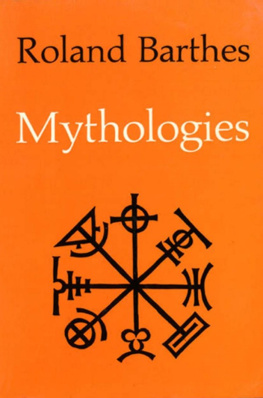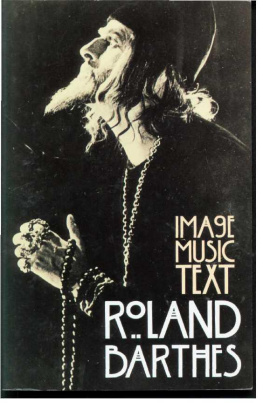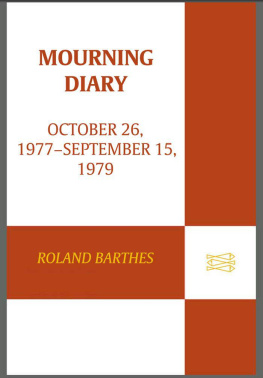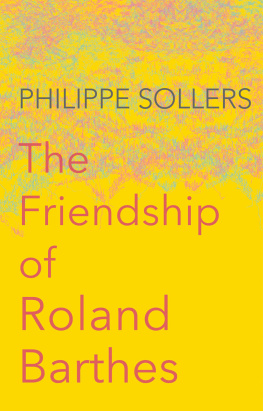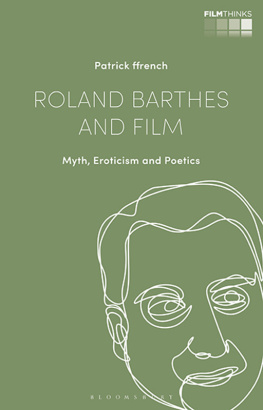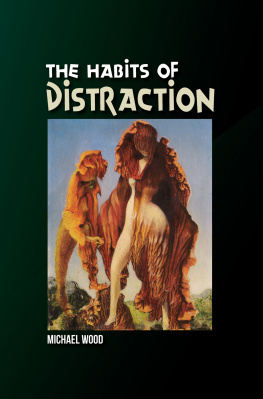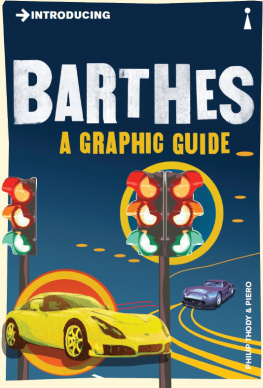MYTHOLOGIES
Roland Barthes
1991
Selected and translated from the French by
ANNETTE LAVERS
Translator's Note
The style of Mythologies , which strikes one at first as being highly poetic and idiosyncratic, later reveals a quasi-technical use of certain terms. This is in part due to an effort to account for the phenomena of mass culture by resorting to new models.
First and foremost among such models, as indicated in the Preface, is linguistics, whose mark is seen not so much in the use of a specialized vocabulary as in the extension to other fields of words normally reserved for speech or writing, such as transcription , retort , reading , univocal (all used in connection with wrestling), or to decipher (plastics or the 'good French Wine'). The author's teaching is also associated with a rediscovery of ancient rhetoric, which provides one of the connotations of the word figure when it is used in connection with cooking or wrestling.
Spectacle and gesture are often irreplaceable and refer to the interplay of action, representation and alienation in man and in society. Other terms belong to philosophical vocabulary, whether traditional (e.g. substance , which also has echoes of Bachelard and Hjelmslev), Sartrean/Marxist (e.g. a paradox, a car or a cathedral are said to be consumed by the public), or recent (e.g. closure , which heralds the combinative approach of semiology and its philosophical consequences). Transference connotes the discoveries of psycho-analysis on the relations between the abstract and the concrete. There is in addition a somewhat humorous plea for a reasoned use of neologism (cf. pp. 120-21) which foreshadows later reflections on the mutual support of linguistic and social conventions.
Such characteristics have been kept in the hope of retaining some of the flavour of the original.
Finally, the author's footnotes are indicated by numerals, and the translator's by asterisks.
Preface to the 1970 edition (Collection 'Points', Le Seuil, Paris)
This book has a double theoretical framework: on the one hand, an ideological critique bearing on the language of so-called mass-culture; on the other, a first attempt to analyse semiologically the mechanics of this language. I had just read Saussure and as a result acquired the conviction that by treating 'collective representations' as sign-systems, one might hope to go further than the pious show of unmasking them and account in detail for the mystification which transforms petit-bourgeois culture into a universal nature.
It is obvious that the two attitudes which determined the origin of the book could no longer today be maintained unchanged (this is why I have made no attempt to bring it up to date). Not because what brought them about has now disappeared, but because ideological criticism, at the very moment when the need for it was again made brutally evident (May '68), has become more sophisticated, or at least ought to do so. Moreover semiological analysis, initiated, at least as far as I am concerned, in the final essay of Mythologies , has developed, become more precise, complicated and differentiated: it has become the theoretical locus wherein a certain liberation of 'the significant', in our country and in the West, may well be enacted. I could not therefore write a new series of mythologies in the form presented here, which belongs to the past.
What remains, however, beside the essential enemy (the bourgeois norm), is the necessary conjunction of these two enterprises: no denunciation without an appropriate method of detailed analysis, no semiology which cannot, in the last analysis, be acknowledged as semioclasm .
February 1970R. B.
Preface
The following essays were written one each month for about two years, from 1954 to 1956, on topics suggested by current events. I was at the time trying to reflect regularly on some myths of French daily life. The media which prompted these reflections may well appear heterogeneous (a newspaper article, a photograph in a weekly, a film, a show, an exhibition), and their subject-matter very arbitrary: I was of course guided by my own current interests.
The starting point of these reflections was usually a feeling of impatience at the sight of the 'naturalness' with which newspapers, art and common sense constantly dress up a reality which, even though it is the one we live in, is undoubtedly determined by history. In short, in the account given of our contemporary circumstances, I resented seeing Nature and History confused at every turn, and I wanted to track down, in the decorative display of what-goes-without-saying , the ideological abuse which, in my view, is hidden there.
Right from the start, the notion of myth seemed to me to explain these examples of the falsely obvious. At that time, I still used the word 'myth' in its traditional sense. But I was already certain of a fact from which I later tried to draw all the consequences: myth is a language. So that while concerning myself with phenomena apparently most unlike literature (a wrestling-match, an elaborate dish, a plastics exhibition), I did not feel I was leaving the field of this general semiology of our bourgeois world, the literary aspect of which I had begun to study in earlier essays. It was only, however, after having explored a number of current social phenomena that I attempted to define contemporary myth in methodical fashion; I have naturally placed this particular essay at the end of the book, since all it does is systematize topics discussed previously.
Having been written month by month, these essays do not pretend to show any organic development: the link between them is rather one of insistence and repetition. For while I don't know whether, as the saying goes, 'things which are repeated are pleasing', my belief is that they are significant. And what I sought throughout this book were significant features. Is this a significance which I read into them? In other words, is there a mythology of the mythologist? No doubt, and the reader will easily see where I stand. But to tell the truth, I don't think that this is quite the right way of stating the problem. 'Demystification'to use a word which is beginning to show signs of wearis not an Olympian operation. What I mean is that I cannot countenance the traditional belief which postulates a natural dichotomy between the objectivity of the scientist and the subjectivity of the writer, as if the former were endowed with a 'freedom' and the latter with a 'vocation' equally suitable for spiriting away or sublimating the actual limitations of their situation. What I claim is to live to the full the contradiction of my time, which may well make sarcasm the condition of truth.
1957R. B.
Mythologies
The World of Wrestling
The grandiloquent truth of gestures on life's great occasions.
Baudelaire
The virtue of all-in wrestling is that it is the spectacle of excess. Here we find a grandiloquence which must have been that of ancient theatres. And in fact wrestling is an open-air spectacle, for what makes the circus or the arena what they are is not the sky (a romantic value suited rather to fashionable occasions), it is the drenching and vertical quality of the flood of light. Even hidden in the most squalid Parisian halls, wrestling partakes of the nature of the great solar spectacles, Greek drama and bullfights: in both, a light without shadow generates an emotion without reserve.
There are people who think that wrestling is an ignoble sport. Wrestling is not a sport, it is a spectacle, and it is no more ignoble to attend a wrestled performance of Suffering than a performance of the sorrows of Arnolphe or Andromaque. Of course, there exists a false wrestling, in which the participants unnecessarily go to great lengths to make a show of a fair fight; this is of no interest. True wrestling, wrongly called amateur wrestling, is performed in second-rate halls, where the public spontaneously attunes itself to the spectacular nature of the contest, like the audience at a suburban cinema. Then these same people wax indignant because wrestling is a stage-managed sport (which ought, by the way, to mitigate its ignominy). The public is completely uninterested in knowing whether the contest is rigged or not, and rightly so; it abandons itself to the primary virtue of the spectacle, which is to abolish all motives and all consequences: what matters is not what it thinks but what it sees.
Next page
